How to Manage Privacy for WordPress User-Generated Content
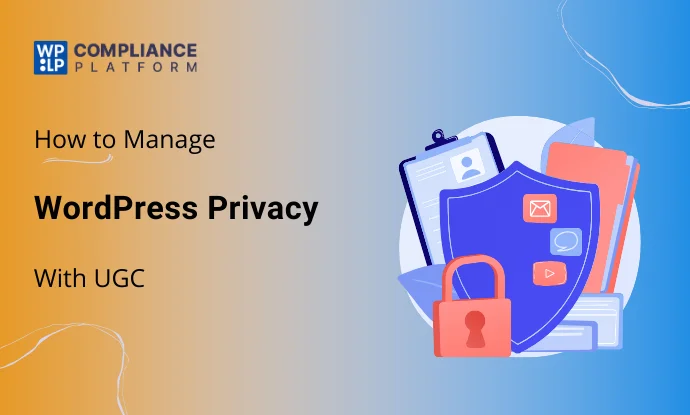
Summary
It also shares practical steps for admins like consent checkboxes, clear privacy notices, moderation rules, and DSAR handling, along with tools that make compliance easier. The role of the WPLP Compliance Platform is highlighted for automating consent, logs, and policy updates.
User-generated content, or UGC, is everywhere in 2026. From blog comments and reviews to full community forums and member profiles, more and more websites are letting people create content. This is great for engagement, but it also brings new privacy challenges.
Privacy laws worldwide are tightening, and regulators are closely monitoring how websites handle user-generated data. For site owners running communities, forums, or membership sites, prioritising privacy is no longer optional.
Trust is now a business asset. Users who don’t feel safe won’t engage, and poor privacy management risks fines and reputational damage.
In this guide, we’ll break down what UGC really means for WordPress, the laws you need to know, and the best ways to keep your community safe and compliant. We’ll also show how the WPLP Compliance Platform makes managing UGC privacy much easier.
- What is User-Generated Content (UGC) on WordPress?
- Legal Risks & Key Regulations (GDPR, CCPA, and More)
- New Regulations Affecting UGC Moderation
- Forum Privacy Compliance: What Every Admin Needs to Know
- Managing Comments: GDPR Policy Essentials
- Privacy for Membership & Community Sites
- Case Studies
- Best Practices for Safeguarding UGC Data
- Consent Management Essentials
- UGC Privacy Plugins and Tools
- FAQ
- Conclusion
What is User-Generated Content (UGC) on WordPress?
User-generated content, or UGC, is any content that visitors or members add to your site. This could be a simple blog comment, a product review, or a full forum post. It also includes profile pictures, uploaded files, private messages, and activity feeds on community or membership sites.
UGC is powerful because it builds community and adds authentic voices to your site. It makes a website feel alive, not just a one-way conversation. However, with that power comes significant privacy challenges.
For example, a comment may include personal information, or a forum profile may expose email addresses, photos, or location data. Once this data is public, it can be hard to control.
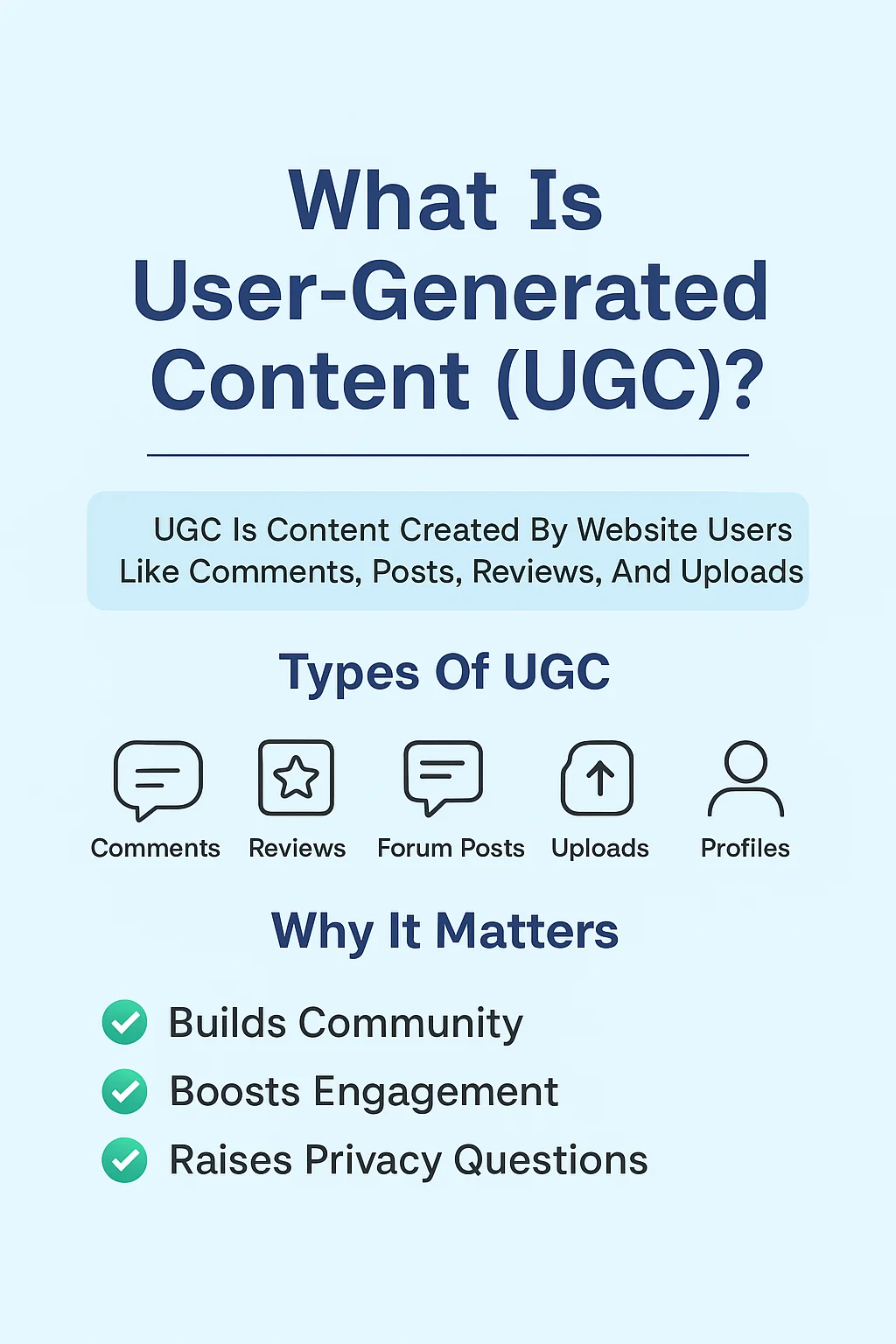
The most significant pain point is that UGC mixes personal data with public content. Site owners must create a balance between keeping content accessible and protecting user privacy. Without clear policies and the right tools, it’s easy to end up storing too much data, exposing sensitive information, or violating privacy laws.
Legal Risks & Key Regulations (GDPR, CCPA, and More)
When users share content on your WordPress site, their privacy is protected by strict laws. These laws are getting tighter every year, and ignoring them can bring serious trouble.
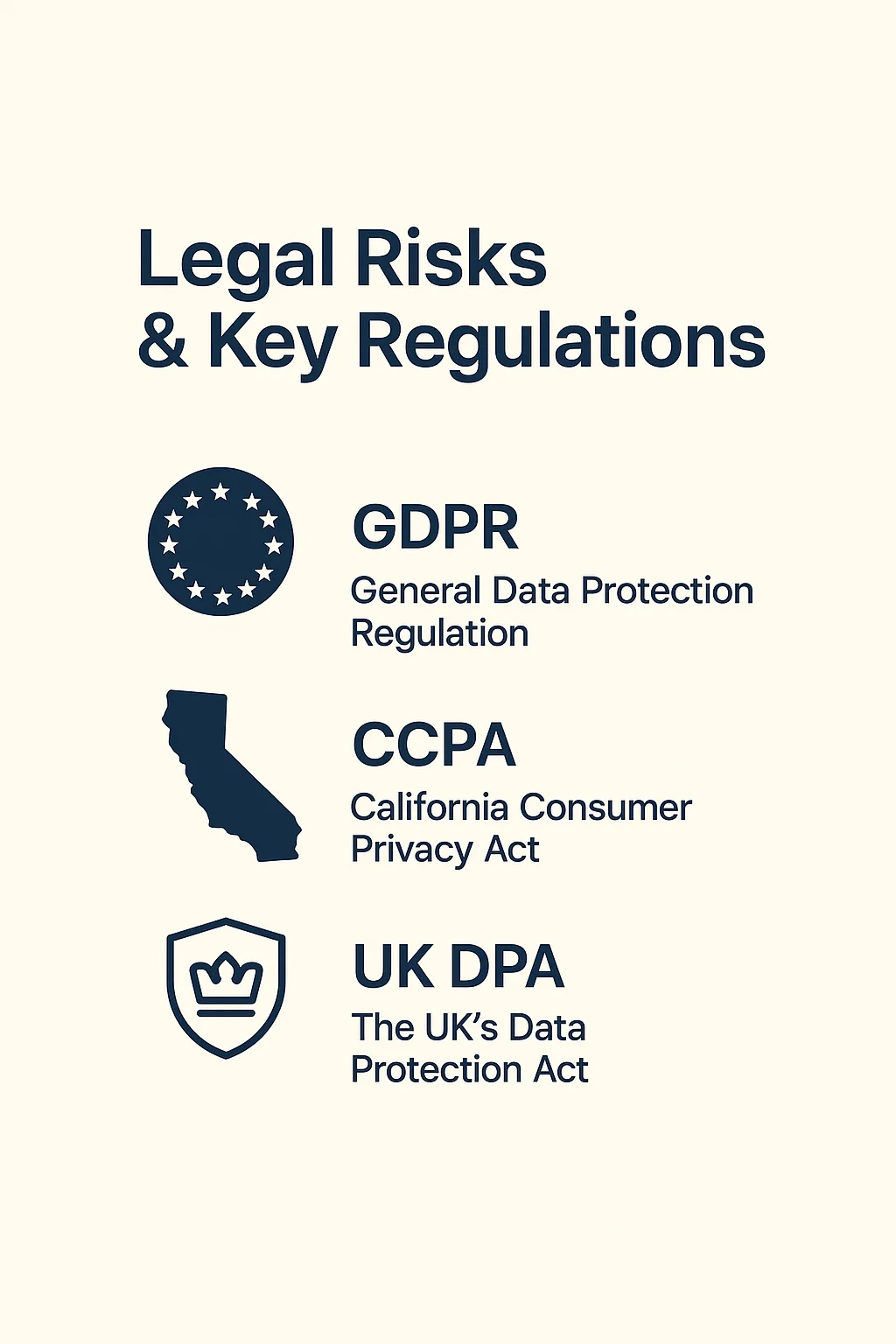
The GDPR (in Europe) and the CCPA (in California) are the two most well-known data protection laws. They make sure people have control over their personal data. This means site owners must collect only what’s needed, ask for consent when storing or showing personal info, and allow users to delete their data if they want.
Other laws, like the UK’s Data Protection Act (DPA) or COPPA in the US (which protects kids under 13), also apply depending on where your users are from. If your site has a global audience, you need to pay attention to all of these.
Key rules include:
- Consent before processing personal data.
- Data minimization (don’t collect more than you need). Do you really need a full postal address for a comment?
- Right to be forgotten (users can request deletion).
- Extra care for children’s data, especially for forums or games with younger audiences.
Following these laws will help you avoid fines and also maintain a website that people trust.
New Regulations Affecting UGC Moderation
Recent laws place direct responsibility on platform owners for how user content and data are handled:
1. EU Digital Services Act (DSA)
The EU Digital Services Act increases the responsibility of site operators who provide user-to-user interaction services (e.g. Social Networks, Forums). As part of the requirements of the EU Digital Services Act, a website owner must take sufficient measures to proactively address potentially illegal or damaging user-generated materials (e.g. Hate Speech, Unlawful Goods, Deceptive Information) as well as materials that violate EC Directives/Regulations regarding allowable content.
Beyond moderation itself, the DSA emphasises transparency and accountability. Platforms are required to clearly explain:
- How content moderation works
- What rules users must follow
- How users can report problematic content
- How and why content may be removed or restricted
These obligations apply broadly to forums, online marketplaces, review platforms, and membership-based communities that target or are accessible to users in the EU, even if the website owner is based elsewhere.
2. UK Online Safety Act
The Online Safety Act prioritises safety first, focusing heavily on creating mechanisms to protect users from harmful or illegal content online. The Act places a duty of care on platforms to make sure user interactions do not create harm. This means websites must identify potential risks, assess how users interact on the platform, and follow clear risk-assessment guidelines to reduce or prevent those risks. The platform must:
- Monitor all user-generated content actively, not just relying on individuals to flag or report at the time of occurrence.
- Have systems in place for reporting and removing harmful or illegal materials.
- Respond rapidly to reports received regarding harmful or illegal content on the user’s platform.
The law is particularly relevant for community platforms, social-style websites, and interactive membership sites, where user-to-user engagement is central to the experience.
What This Means for WordPress Sites
If your WordPress website allows users to comment, post, upload content, create profiles, or interact with others, these laws directly affect you. You must be able to clearly communicate:
- How user content is moderated
- How users can report violations
- How long content and related data are stored
- When and why content may be removed
- What rights users have regarding their data and contributions
All of this information should be accurately reflected in your Privacy Policy, Terms of Service, and Community Guidelines. Failing to do so not only increases legal risk but can also damage user trust.
Forum Privacy Compliance: What Every Admin Needs to Know
If you manage a WordPress forum where users can post their own content, privacy should always be on your mind. A thriving community is excellent, but so is protecting your users’ personal information.
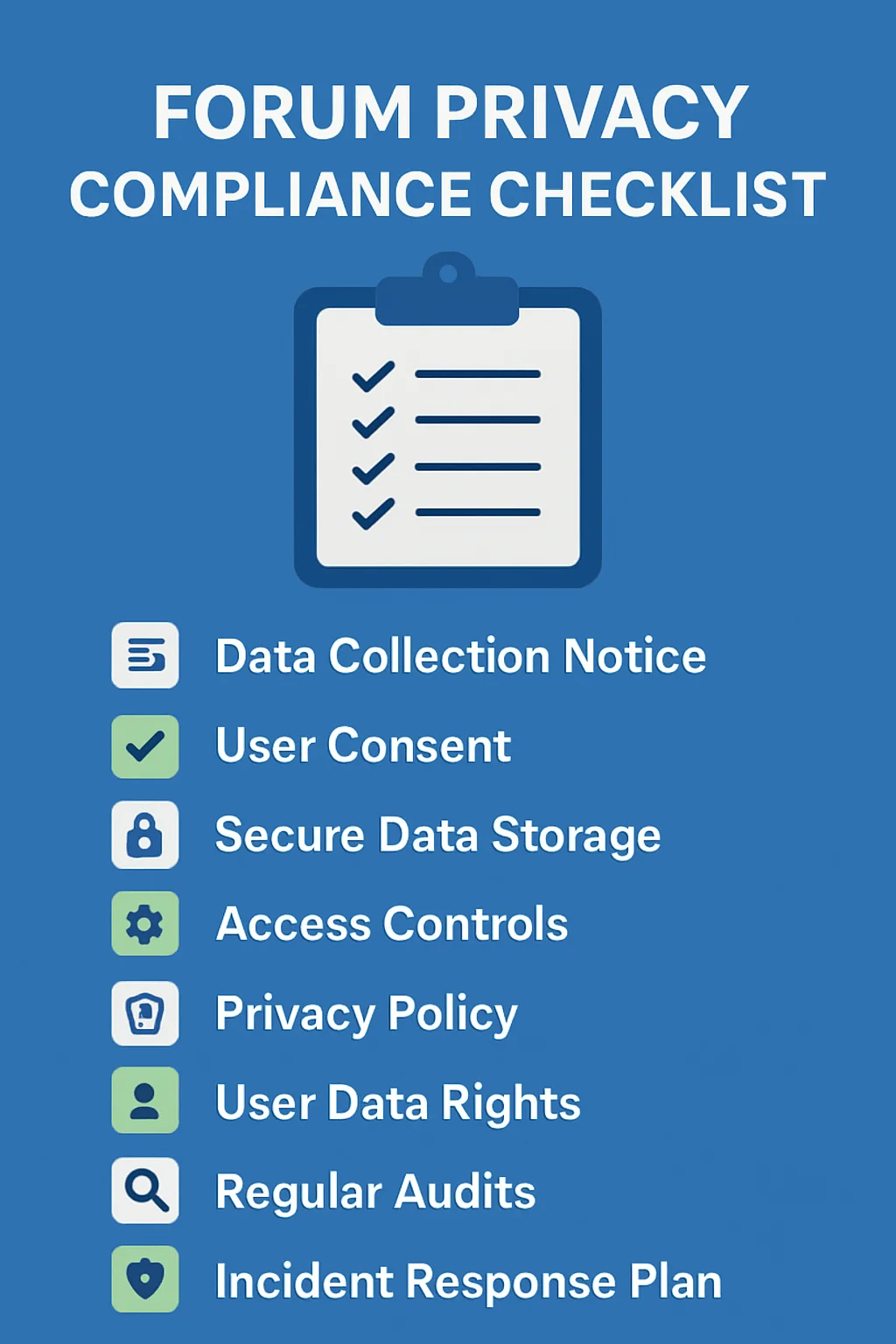
Here’s an informational guide to staying compliant and avoiding common slipups.
Take These Steps for Compliance
Some of the important steps to take for forum compliance include:
1. Clear Privacy Notices
Make sure your privacy policy is easy to find and easy to understand. Let users know exactly what information you collect, why you need it, and how you use it. Update this notice whenever you change how your forum works
2. Easy Data Requests
If users want to see their own data or ask you to delete it, have a simple process in place. WordPress plugins can automate this, but even a clear contact form and a quick response go a long way.
3. Data Retention Rules
Decide how long you’ll keep user information and stick to that rule. Get rid of old accounts and posts you don’t need anymore. This keeps your database clean and lessens risk.
4. Get Consent for Public Posts
Ensure that people understand the visibility of their posts before publishing. Offer options to post anonymously or under a nickname. Always respect people’s choices.
5. Train Your Moderators
Teach your moderators about privacy best practices. They should know how to handle requests for post removal, protect sensitive info, and what to do if a privacy issue comes up.
Mistakes To Avoid
Some of the common mistakes every website owner needs to know:
1. Storing Data Indefinitely
One of the biggest mistakes is keeping user data forever. This poses a risk to both privacy and compliance. Set clear schedules for deleting or anonymizing old data.
2. Vague or Hidden Privacy Policies
If your privacy notice is hard to find or filled with complicated language, users won’t trust you. Keep it simple and accessible.
3. Ignoring User Requests
If someone requests their data or to be forgotten, respond promptly. Failing to do so can put you in trouble.
4. Assuming Everyone Wants to Share
Not everyone wants to use their real name or have personal details shown. Always ask, and always give people a choice.
Regularly check your privacy practices, listen to your users, and keep your team informed. That’s how you maintain forum privacy compliance. Failing to comply leads to your website being penalised and paying hefty fines.
Managing Comments: GDPR Policy Essentials
If your WordPress site allows blog comments, you are collecting user data every time someone posts. That means you need to handle comments carefully, not just for legal reasons, but to build trust with your visitors. Here’s what you need to know and do to stay compliant with GDPR.
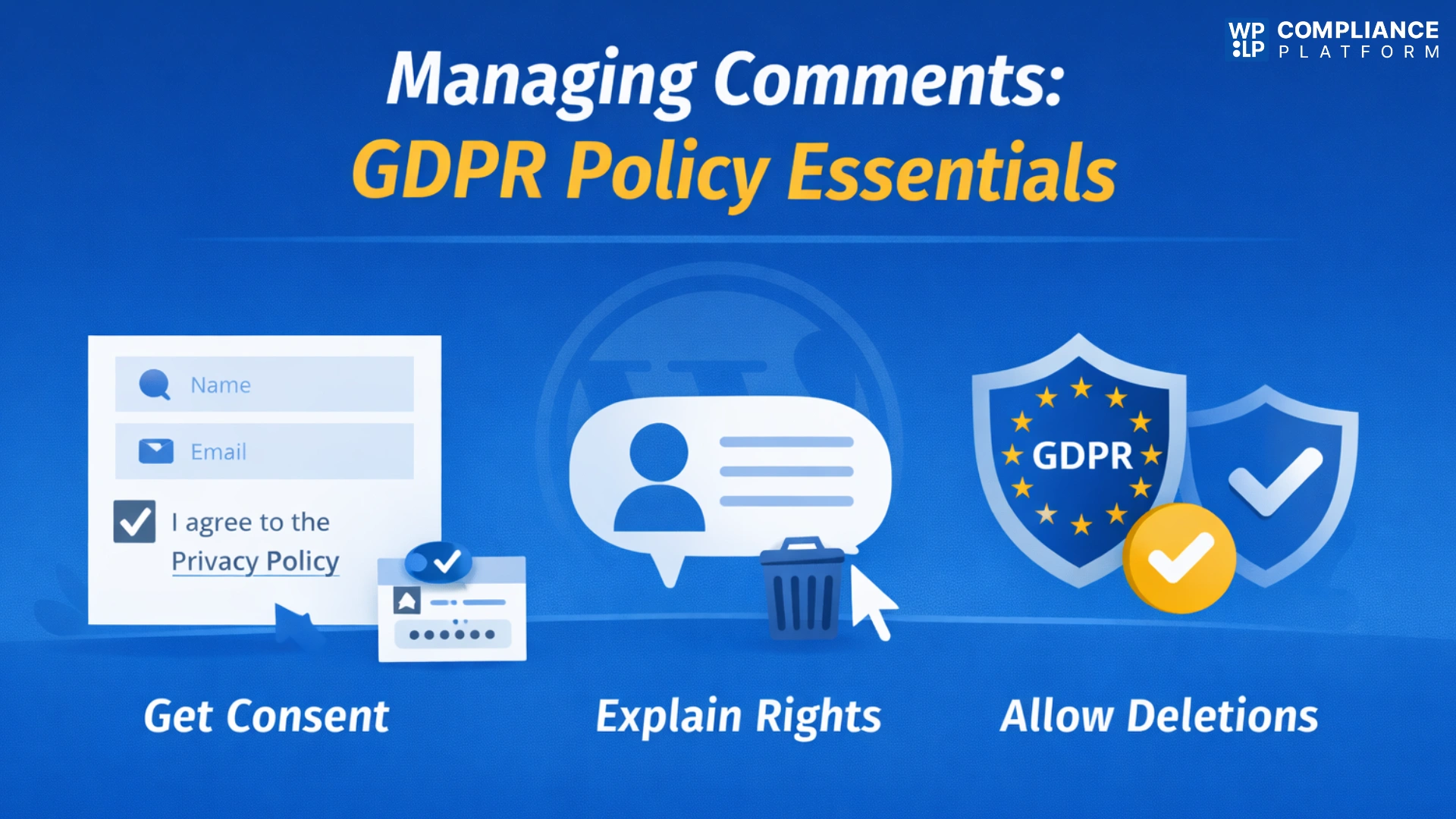
Practical Checklist for Blog Comments
As the admin, it’s your job to make sure everything about comment collection is clear and user-friendly. Let’s go through the essentials.
1. Consent Checkboxes for Comments
Always add a clear, unchecked checkbox that asks users to agree to your privacy policy before they can leave a comment. Under GDPR, you must get explicit consent before gathering any personal data. Never assume users agree just because they typed a comment.
2. Clear Privacy Statements
Right next to your comment box, include a short, easy to read note about what information you collect and why. Link to your full privacy policy for the details. People should never wonder what happens to their data after they hit submit.
3. Comment Opt outs and Deletion Rights
Make it simple for users to request deletion of their comments or any personal information. Offer a contact form or a direct link for these requests. Respond quickly and politely. These steps show you respect user rights and help you comply with regulations.
Examples
Let’s look at what works and what does not.
1. A Good Example
A blog has a comment form that asks, “I agree to the privacy policy” with an unchecked box users must select. There’s a brief note explaining what data is collected and a link to request comment deletion. The process is clear and puts the user in control.
2. A Bad Example
A blog lets visitors leave comments using their email and name, but does not ask for consent, does not explain data use, and makes it difficult to delete comments or contact the admin. Users have no clear information or control over their data, which is a problem for both trust and compliance.
Keeping your comment system transparent and respectful is more than just following rules. It shows your readers you care about their privacy. Make your processes easy to understand, keep users informed, and respond to their requests. That’s how you create a safe, welcoming space for conversation and stay on the right side of GDPR.
Privacy for Membership & Community Sites
If you run a community site or forum on WordPress, privacy gets a lot more important. On these sites, people share information, pictures, and even private messages. Sometimes, they pay for special access. All of this means you have extra responsibility for keeping everyone’s information safe.
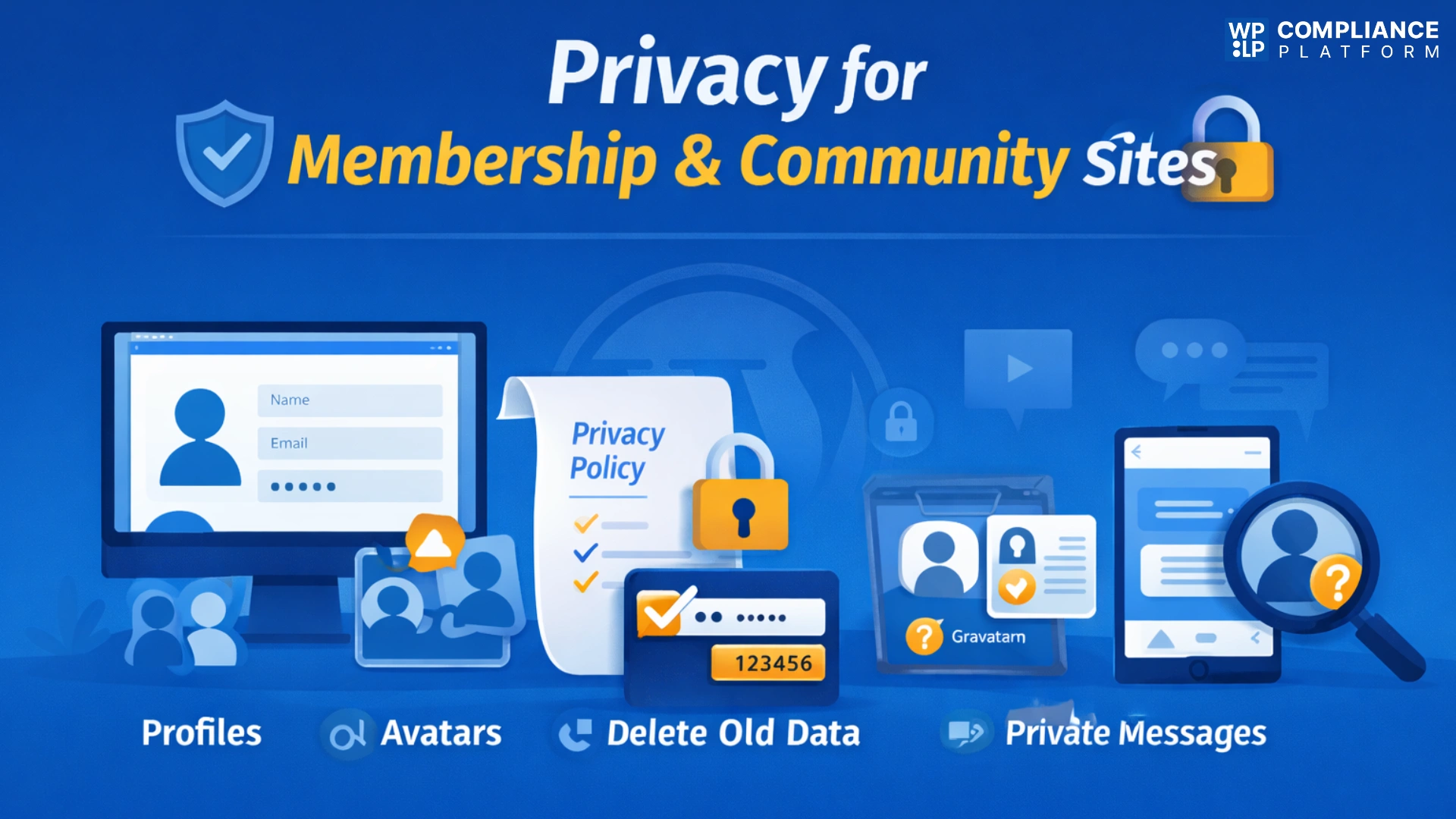
Key Areas for Privacy Management
First, user profiles need careful attention. Visitors can join, create profiles, and sometimes share personal details or photos. It’s essential to give everyone control over what others can see. Letting users remove or download their own information is also a must. That way, people always feel respected and safe.
Avatars, or profile pictures, might seem small, but they can reveal more than you’d expect. If you use a service like Gravatar, those pictures might be linked to someone’s email address.
Always give users the choice: upload their own picture, skip the avatar, or use Gravatar if they prefer. For private groups, you can even review avatars before they appear, just to be safe.
Private messaging is another big deal. People want their conversations to be truly private. Use plugins that keep messages secure and allow users to block each other if necessary.
Additionally, it’s essential to be clear about whether staff can ever see those messages, to inform people upfront, and to explain why, if it ever happens.
Behind the scenes, your site keeps logs of what happens. These logs help keep things secure, but you should only keep what you need. Set a time limit for how long logs are stored, and always inform users about the data being logged and its retention period.
Special Advice for Paid or Private Communities
For paid or private communities, people expect even more privacy and security. Use strong passwords, two-factor login, and limit who can be an admin. Select a secure host and keep your plugins up to date.
When someone has a question related to their privacy, answer them quickly. For groups that talk about sensitive topics, always ask for permission before collecting any personal information, especially photos or other details that could accidentally reveal someone’s identity.
Some sites make mistakes, such as collecting too much information or disregarding user privacy settings. Others forget to train their teams on privacy or believe that privacy laws don’t apply to private sites. The truth is, laws like GDPR and CCPA still matter, no matter who can see what.
At one glance, running a community site is about trust. People stay when they feel safe. Keep your privacy policy simple and easy to understand, and make privacy settings easy to use.
The most crucial point is to give users control over their own information. That’s the best way to build a community that complies with all the global laws.
Case Studies
Global privacy laws are becoming stricter, and regulators are paying close attention to how websites manage user-generated data. If you operate a community, forum, or membership site, making privacy a priority is no longer optional.
High-profile failures like the Reddit data scraping incident and Facebook’s Cambridge Analytica scandal highlight the risks of mishandling UGC. However, platforms like Discord have gained user trust and commitment to privacy by providing privacy controls and transparency reporting.
Best Practices for Safeguarding UGC Data
When you run a site where users can post their own content, like comments, photos, or forum posts, it’s not enough to just collect and store this data. You have to protect it, respect privacy, and be upfront about how everything works. Here’s what actually matters for keeping user-generated content safe.

Be Transparent With Users
The best way to earn trust is to be clear about what you’re doing with people’s data. Use straightforward language, no legal jargon, to explain what kind of information you collect, why you need it, and what happens to it. Put this information where users can easily find it, like right above the comment box or next to any upload form.
If your privacy notice is long, break it up so users can choose how much detail they want to read. Make sure your privacy policy is always up to date and easy to understand.
Collect Only What You Need
Don’t ask for more information than you actually need. Think about whether you really need someone’s full name, email, or other personal details just to leave a comment or post a photo. The less data you collect, the easier it is to protect and the less you have to worry about. This “data minimization” approach is good for both compliance and user confidence.
Delete Old Data Regularly
Set up clear rules for how long you keep user-generated content and personal data. Delete or anonymize old posts, comments, and inactive accounts on a regular schedule. Don’t hold on to information you no longer need, this reduces risk and helps you stay on the right side of privacy laws.
Keep Backups Secure
Backing up your site is important, but you need to protect those backups, too. Only let trusted people have access, store them somewhere safe, and don’t keep backups longer than necessary. This way, even if something goes wrong, you’re not accidentally exposing private information.
Moderate Carefully
Encourage users to think before they post personal information. Write clear rules about what should never be shared publicly, things like phone numbers, addresses, or ID numbers. Enforce these rules with active moderation and user reporting tools. If someone posts something sensitive, take it down quickly. Remind users that anything they post online can be copied, shared, or seen by others, even in “private” groups.
Consent Management Essentials
When users post comments, share files, or create profiles, they are giving you their personal data. Privacy laws say you need clear consent before collecting and using this data. That means no hidden boxes or tricky wording. Users should know what they are agreeing to.
Collecting consent is only the first step. You also need to log it. This means keeping a record of when and how the user gave permission. Why? Because if someone asks later, you can show proof. Good cookie logs protect both your users and your site.
Managing consent is just as important. People may change their minds. They might want to update or even take back their consent. A privacy-friendly site makes this easy with opt-out tools, simple forms, or quick support replies.
This is where the WPLP Compliance Platform makes things much simpler. It can automate consent collection, store proof in audit logs, handle DSARs (data requests), and update your privacy policies across your site. So instead of worrying about missing a step, you can focus on running your site while staying compliant.
UGC Privacy Plugins and Tools
WordPress has many plugins that help with privacy. But when it comes to user-generated content (UGC) like comments, profiles, or forum posts, not all tools do the job. Some focus only on cookie banners. Others may not handle things like audit logs or DSARs.
A good plugin for UGC privacy should do more than just ask for consent. It should also keep records, make data requests easy, and support features like export or deletion of user content. This keeps your site safe and builds trust with your community.
Here’s a simple comparison of the most popular tools:
Feature Comparison Table
| Plugin/Tool | Core Features | Compliance Scope | UGC-Specific Support |
|---|---|---|---|
| WPLP Compliance Platform | Consent banners, audit logs, DSAR management, privacy policy generator | GDPR, CCPA, ePrivacy, global laws | Full UGC support – comments, forums, profiles, member uploads |
| Complianz | Cookie consent, policy generator, region-specific settings | GDPR, CCPA, LGPD | Mainly cookies, not full UGC |
| WP Legal Pages | Legal policy templates (Privacy Policy, T&C, Cookie Policy) | GDPR, CCPA | Focuses on static policies, and less on UGC tools |
| GDPR Cookie Consent | Consent banner, cookie scanning, script blocking | GDPR, CCPA | cookie-only tool, no UGC privacy |
FAQ
UGC privacy on WordPress means protecting personal data that users share on your site. This includes comments, forum posts, profiles, and member uploads. Site owners must collect consent, keep data safe, and give users control over their information.
Yes. Under GDPR, even a simple blog comment can count as personal data if it includes names, emails, or IP addresses. You must tell users how their data is stored, ask for consent, and give them the right to request deletion.
For a Data Subject Access Request (DSAR), you must provide all personal data linked to the user. On a forum, this can include profile details, posts, private messages, and activity logs. The data must be shared in a clear, portable format.
You can automate privacy policy updates on WordPress using compliance plugins. Tools like the WPLP Compliance Platform help by syncing policy templates, updating region-specific laws, and displaying the latest version on your site without manual edits.
Conclusion
User-generated content makes a site more engaging, but it also brings privacy responsibilities. Ignoring these can put both site owners and users at risk.
By adding clear consent steps and transparent policies, you build a safer space for your community. Privacy should feel natural, not forced.
Tools like compliance platforms make it easier to handle consent, DSARs, and policy updates without stress. This helps you focus on growing your site.
Also, respecting UGC privacy is about trust. People are trusting your platform and making content. So make sure you abide by the rules and regulations of the privacy laws like GDPR and CCPA.
If you’ve liked reading this article, check out our other similar content:
- How to Prepare Your WordPress Site for the End of Third-Party Cookies
- Interactive Privacy Centers: Making Compliance User-Friendly
- Consent or Pay Models: Are Paywall Cookie Consent Legal For Site?
Do you want your website to comply with all the global privacy laws? Grab the WPLP Compliance Platform now!
